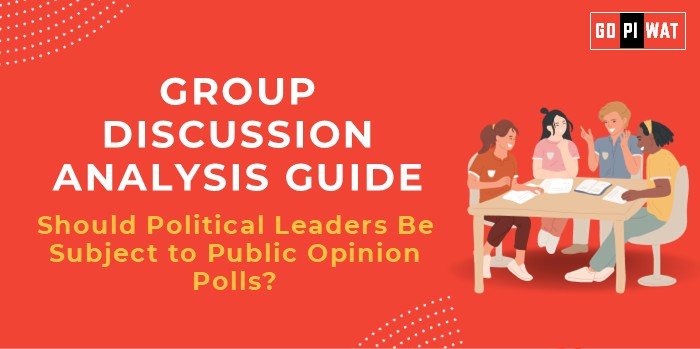📋 Group Discussion Analysis Guide
🌟 Topic: Should Political Leaders Be Subject to Public Opinion Polls?
🌐 Introduction
Public opinion polls have emerged as influential tools in democracies worldwide, shaping political decisions and governance strategies. Despite their importance, concerns about accuracy and over-reliance on polls persist, sparking global debates.
📊 Quick Facts & Key Statistics
- 🌍 Global Polling Usage: Widely used to gauge citizens’ views, influencing democratic processes.
- ⚠️ Polling Errors: Historical inaccuracies, like the 2015 UK General Election, overestimated Labour’s support.
- 📰 Media Influence: Extensive media coverage shapes public perception and voting behavior.
- 📜 Impact on Policies: Polls help align policies with public preferences but risk encouraging populism.
🧑🤝🧑 Stakeholders and Their Roles
- 👥 Citizens: Provide critical input reflecting societal preferences.
- 🏛️ Political Leaders: Use poll results to shape strategies and decisions.
- 📈 Polling Agencies: Gather and analyze data to inform public discourse.
- 📰 Media: Amplify poll results, influencing public opinion and election dynamics.
- 🎓 Academia: Critique methodologies and evaluate societal impacts.
🎉 Achievements and Challenges
🎉 Achievements:
- 🗳️ Enhanced Representation: Reflect societal preferences, fostering participatory governance.
- 📋 Informed Decision-Making: Leaders gain insights into public needs, aligning policies accordingly.
- 📣 Increased Awareness: Polls engage citizens in political discourse.
- 🔄 Policy Adaptation: Enable leaders to adjust strategies in real time.
⚠️ Challenges:
- ❌ Inaccuracy Risks: Examples like the 2015 UK General Election reveal polling limitations.
- 📰 Media Influence: Over-reliance on polls risks skewing public perceptions.
- 📉 Populism and Short-Termism: Leaders may prioritize immediate approval over long-term vision.
💡 Effective Discussion Approaches
- 📢 Opening Approaches:
- Present impactful data, such as the influence of polls on democratic processes.
- Highlight case studies like the 2015 UK General Election to demonstrate challenges.
- 🛠️ Counter-Argument Handling:
- Use robust data to challenge inaccuracies.
- Emphasize the importance of methodological improvements and transparency.
🔍 Strategic Analysis of Strengths & Weaknesses
✅ Strengths:
- Enables citizen representation.
- Informs leaders and encourages engagement.
❌ Weaknesses:
- Susceptible to biases, manipulation, and inaccuracies.
📈 Opportunities:
- Adopting technological advancements like AI for better polling methods.
⚠️ Threats:
- Over-dependence on polls risks undermining visionary leadership.
📝 Structured Arguments for Discussion
- 👍 Supporting Stance: “Opinion polls bridge the gap between leaders and citizens, fostering participatory governance.”
- 👎 Opposing Stance: “Poll reliance risks populism, inaccurate data, and undermining long-term policy vision.”
- ⚖️ Balanced Perspective: “While polls provide valuable insights, methodological reforms are critical to enhancing their reliability.”
🎓 Connecting with B-School Applications
- 📊 Real-World Applications: Poll data analysis for market research, leadership strategies, or policy evaluation.
- 💬 Sample Questions:
- “How can polling errors influence governance?”
- “Discuss the role of media in shaping public opinion through polls.”
- 📘 Insights for Students: Understanding public sentiment can inform data-driven decision-making and policy formulation.


